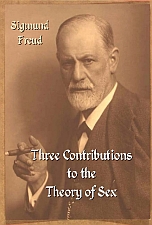
Three Contributions to the Theory of Sex

Description
to the
Theory of Sex
by Sigmund Freud
(1920)
The fact of sexual need in man and animal is expressed in biology by the assumption of a "sexual impulse." This impulse is made analogous to the impulse of taking nourishment, and to hunger. The sexual expression corresponding to hunger not being found colloquilly, science uses the expression "libido."
The subject of the sexual instinct and its aberrations has long been before the scientific world and the names of many effective toilers in this vast field are known to every student. When one passes beyond the strict domains of science and considers what is reported of the sexual life in folkways and art-lore and the history of primitive culture and in romance, the sources of information are immense. Freud has made considerable additions to this stock of knowledge, but he has done also something of far greater consequence than this.
Excerpt from the Introduction:
He has worked out, with incredible penetration, the part which this instinct plays in every phase of human life and in the development of human character, and has been able to establish on a firm footing the remarkable thesis that psychoneurotic illnesses never occur with a perfectly normal sexual life. Other sorts of emotions contribute to the result, but some aberration of the sexual life is always present, as the cause of especially insistent emotions and repressions.
 In the study of perversions we have gained an insight into the fact that the sexual impulse has to struggle against certain psychic forces, resistances, among which shame and loathing are most prominent. We may presume that these forces are employed to confine the impulse within the accepted normal limits, and if they have become developed in the individual before the sexual impulse has attained its full strength, it is really they which have directed it in the course of development.
In the study of perversions we have gained an insight into the fact that the sexual impulse has to struggle against certain psychic forces, resistances, among which shame and loathing are most prominent. We may presume that these forces are employed to confine the impulse within the accepted normal limits, and if they have become developed in the individual before the sexual impulse has attained its full strength, it is really they which have directed it in the course of development.
We have furthermore remarked that some of the examined perversions can be comprehended only by assuming the union of many motives. If they are amenable to analysis-disintegration-they must be of a composite nature. This may give us a hint that the sexual impulse itself may not be something simple, that it may on the contrary be composed of many components which detach themselves to form perversions. Our clinical observation thus calls our attention to fusions which have lost their expression in the uniform normal behavior.
Paperback, 5 x 8, 180+ pages















